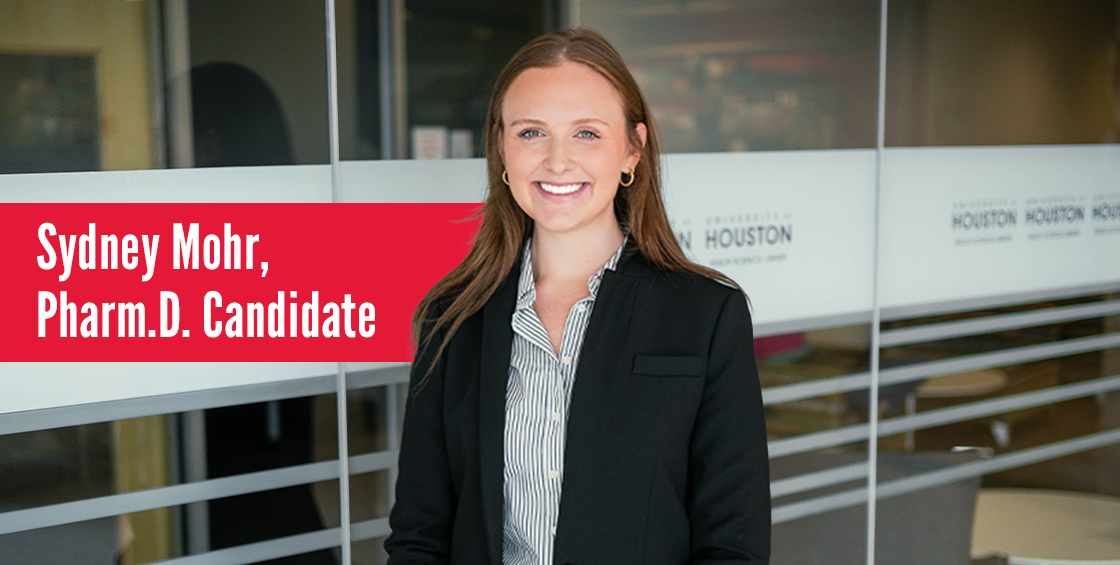Student Feature: Sydney Mohr

From Clinical Trials to Clinical Care
Pharm.D. Candidate Sydney Mohr Builds Pharmacy Career on Research Foundation
Many young people dream of becoming physicians or nurses when they first envision a career in health care. For fourth-year University of Houston College of Pharmacy (UHCOP) Pharm.D. student Sydney Mohr, that path initially pointed to psychiatry.
"Throughout elementary, middle and high school, I wanted to go to medical school," Mohr said. "I wanted to become a psychiatrist."
But once in college, the idea of medical school began to fade and that shift opened up to a new professional interest: pharmacy.
Discovering Purpose Through Research
After earning her undergraduate degree, Mohr spent two years as a clinical research associate working on multiple myeloma and lymphoma trials at Massachusetts General Hospital. It was during this time that her fascination with pharmacy truly ignited.
"I saw how long-established medications could be used in novel ways, providing a fresh approach to patient care," Mohr said. "Often these clinical trials are the last-line therapies when patients have gone through all the options. We were helping really sick patients."
Mohr worked closely with pharmacists throughout the process, from drug acquisition in biotech to site monitoring and auditing clinical data.
"That's when I realized I wanted to pursue pharmacy," Mohr said.
Coming Home to Houston
When it came time to choose a pharmacy school, Mohr felt drawn back to her hometown of Houston, a city she had left in high school when her family relocated to the Northeast.
Beyond being home, Houston stood out for another reason: The Texas Medical Center.
"The Texas Medical Center set Houston apart from the rest of the state," Mohr said.
A visit to the UHCOP sealed her decision.
"The tour guides were welcoming, the building was beautiful, and the vibe was just right," Mohr said. "I felt instantly at home."
A New Lens on Research
During her P2 year, Mohr attended a research roundtable where faculty introduced students to their research projects. When she learned Research Assistant Professor Onye Ononogbu, Pharm.D., MPH, BCOP, was conducting multiple myeloma research, she saw a chance to continue the work she had started—but this time through the lens of pharmacy.
Her research focus centered on patient outcomes at a county hospital—a stark contrast to the prestigious research environment in which she previously worked.
"At Massachusetts General Hospital, you had all this shiny research going on, and then you get to the other side of it, where patients are struggling to even get their medication," Mohr said.
Under Ononogbu's guidance, Mohr gained firsthand insights into the barriers patients face.
"The patients are very sick and don't have a lot of access to medication," Mohr said. "There are a lot of socioeconomic factors involved, and Dr. Ononogbu is trying to shed light on things that are very clearly an issue."
Mohr's research didn't stop at oncology. She's also worked with Research Assistant Professor Taryn Eubank, Pharm.D., BCIDP—whom she considers a mentor—on infectious disease projects, an area Mohr considers vital to every pharmacist's toolkit.
"You'll always need to know infectious diseases and have that knowledge in your back pocket no matter which area of pharmacy you work in," Mohr said.
Rising to the Challenge
Mohr's skills were tested and sharpened through pharmacy competitions. She and her teammates earned third place in the Texas Society of Health-System Pharmacy (TSHP) Leadership Challenge, where they tackled the nationwide IV fluid shortage.
"It was definitely out of my comfort zone, but I had teammates with unique experiences that allowed us to collaborate effectively," Mohr said.
She also competed and placed third in the Industry Pharmacists Organization (IPhO) VIP Case Competition, which challenges students to bring a mock drug to market.
"I was on the medical affairs team," Mohr said. "I enjoyed this competition because I was familiar with the content and felt ahead of the curve."
Empowered to Lead, Committed to Serve
Throughout her time at UHCOP, Mohr has embraced leadership not for recognition, but to build community and uplift her peers. Her roles include Rho Chi Society chapter president, Class Council social chair and secretary, and multiple Phi Delta Chi pharmacy fraternity leadership positions.
"Any position you're in gives you the opportunity to lead," Mohr said. "It took me a little longer to find my outspoken voice, but I finally felt ready when I was inducted into Rho Chi."
That voice was nurtured by mentors like Clinical Associate Professor and Assistant Dean for Student and Professional Affairs Kimberly Nguyen, Pharm.D. ('02), who helped her build self-assurance.
"Dr. Nguyen really helped me build my confidence," Mohr said. "It took me three years to find that voice, but once I did, I realized I could take on more and contribute in meaningful ways."
As a tutor, Mohr found joy in supporting others the way she'd once been supported.
"I have always loved learning, and it feels fulfilling to help someone next to me," Mohr said. "Having that one person who says, 'If you need anything, reach out,' has always been invaluable to me, so I want to be that person to others."
Mohr's experiences have also shaped how she hopes to give back to the next generation of pharmacy students.
"I also want to be a preceptor," Mohr said. "Having amazing preceptors inspired me to be that person for someone else five or six years from now."
Preparing for the Profession
As she enters her fourth year, Mohr is focused on securing a residency in the Texas Medical Center and becoming a clinical pharmacist. Her Longitudinal Advanced Pharmacy Practice Experience (LAPPE) rotations at Baylor St. Luke's Medical Center include electives in cardiovascular, intensive care unit (ICU), infectious disease, and solid organ transplant—fields that reflect her commitment to high-impact, specialized care.
"P4 year will be about challenging myself, learning new things, and preparing for residency," Mohr said. "I want to empower patients through knowledge, and as a pharmacist, I have the opportunity to effect change in those little moments."
— Lauren Nguyen